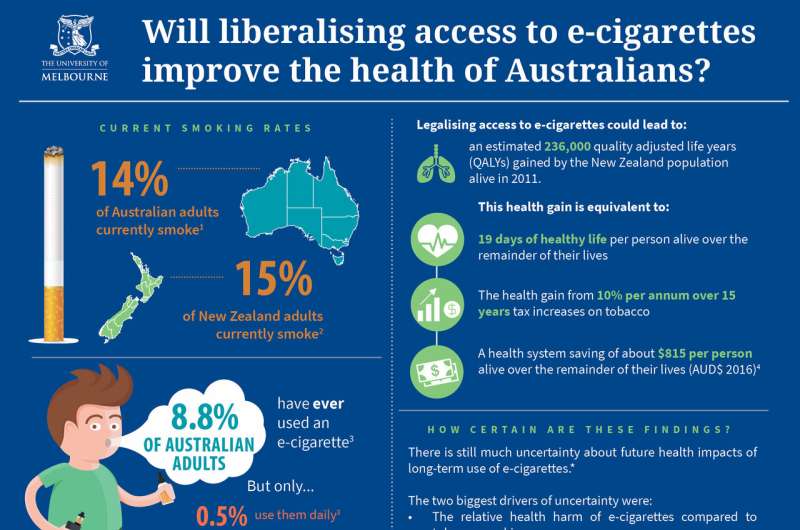Easier access to nicotine vaping products likely to improve public health and reduce health system costs, study says

Easier access to e-cigarettes containing nicotine is highly likely to lead to health gains and cost savings in the health sector, Australian and New Zealand researchers have found.
The research modelled what would happen if the number of people in New Zealand who vape increased due to greater access to nicotine-containing e-cigarettes compared to current patterns of use. Researchers say the results are applicable to Australia.
Published in Epidemiology, the study found that the most likely outcome is a health benefit equivalent to adding an extra 19 healthy days to the life of each living New Zealander, due to the health gained by those who quit smoking due to taking up vaping.
Due to uncertainty about the impact of long-term e-cigarette use, the average gains per person ranged from 2-37 healthy days – but it was clear that the overall health impact was positive under realistic assumptions.
The likely NZ$3.4 billion (AUD$3.27 billion) cost savings (range NZ$370 million-$7.1 billion [AUD$356 million-AUD$6.8 billion]) resulted from fewer people developing tobacco-related diseases because e-cigarettes are less harmful than smoking, although they are not risk-free.
The UK and USA have relatively liberal regulations over the sale of these products, while Australia, Thailand and Singapore have various bans. Restrictions have been recently relaxed in New Zealand, allowing adults to access nicotine vaping products without a prescription.
University of Melbourne professor and senior author Tony Blakely said the results provided important learnings for Australia. "New Zealand and Australia are reasonably similar in disease and smoking rates," he said.
"The New Zealand best estimate of health gain is equivalent to 19 days of healthy life per person alive over the remainder of their lives – a measure we can probably transport across the Tasman."
The study's health gains were similar to those from well-established public health interventions, such as a 10 per cent annual tobacco tax increase for 15 years, or a national colorectal cancer screening program.
"Policy making regarding e-cigarettes is challenging," Professor Blakely said. "Nevertheless, our study points to cautious liberalisation of access to e-cigarettes as the best way forward. That policy implementation should not be in isolation but accompanied by other policies that will make health gain more likely."
The researchers recommend that vaping product sales include expert advice on how to use them, such as the best type of device and the appropriate nicotine concentration.
Co-author and University of Queensland researcher, Associate Professor Coral Gartner said the findings supported New Zealand's new regulatory approach that kept vaporised nicotine products excise tax free and cheaper than smoking.
"Accompanying regulations to minimise the risks of youth uptake of vaping are needed including restrictions on marketing and where the products can be sold," Associate Professor Gartner says.
"Moreover, strengthened policy on tobacco cigarettes, such as reducing the number of retail outlets, could work in tandem with greater access to nicotine vaping products to achieve maximal health gains."
More information: Frederieke S. Petrović-van der Deen et al. Potential country-level health and cost impacts of legalizing domestic sale of vaporized nicotine products, Epidemiology (2019). DOI: 10.1097/EDE.0000000000000975





















